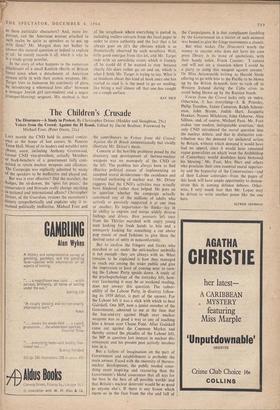The Children's %Crusade
LAST month the CND held its annual confer- ence at the home of lost causes, St. Pancras Town Hall. Many of its leaders and notables were absent, some, including Anthony Greenwood, former CND vice-president, actually Members or, back-benchers of a government fully com- muted to retain nuclear weapons and alliances. The Campaign was explicitly admitted by many of the speakers to be ineffective and played out.
But was it ever effective?.Did the marches, the badges, the sit-downs, the 'spies for peace,' the ?amaraderie and bravado really change anything In national and international affairs? Christopher Driver, of the Guardian, reviews the movement's history sympathetically and explains why it re- mained politically ineffective. Michael Foot and the contributors to Voices from the Crowd: Against the 11 Bomb unintentionally but vividly illuStrate Mr. Driver's thesis.
Concern at the horrible problems posed by the discovery and development of thermo-nuclear weapons was no monopoly of the. CND or- the left. The problem has always been to find effective political means of implementing an accepted moral desideratum—the avoidance and eventual outlawing of nuclear war. Mr. Driver suggests that the CND's activities may actually have hindered rather than helped. He goes on to question whether the campaign actually convinced any of the millions of adults who actively or passively supported it at one time or another. Its importance—he thinks—lay in its 'ability to express and merge widely diverse feelings and drives. Bien petunias left over from the Thirties marched with angry young men looking for fresh hands to bite and, a teenagerie looking for something a cut above pop music or mod fashions to give them the desired sense of unity in nonconformity.
But to analyse the fringers and freaks who marched or sat under the anti-nuclear umbrella is not enough—they are always with us. What remains to be, explained is how they managed to reach out among the wider public and give the impression at least of coming near to turn- ing the Labour Party upside down. A study of the psychopathology of the everyday left, how- ever fascinating it may be as weekend reading, does not answer this question. The vulner- ability of the Labour Party, in disarray follow- ing its 1959- defeat, is part of the answer. For the Labour left it was a stick with which to beat Gaitskell. One MP, now a junior member of the Government, admitted to me at the time that the hue-and-cry against Hugh over nuclear weapons was as good a way as any of teaching him a lesson over Clause Four. After Gaitskell came out against the Common Market and thereby earned the, plaudits of the Labour left, the MP in question lost interest in nuclear dis- armament and his present post actively involves him in it.
But a failure of imagination on the part of Government and establishment is probably the main answer. Faced with the enormity of thermo- nuclear development, the public needed some- thing more inspiring and reassuring than the. Government's bland assurances that all was for the best in the best of all possible worlds and that Britain's nuclear deterrent would be as good as anyone else's. If there is any lesson which stares us in the face from the rise and fall of the Campaigners, it is that complacent fumbling by the 'Government on a matter of such moment was bound to give the fringe movements a chance.
But what makes The Disarmers worth the money to anyone who does not have his own press library is its trove of quotations, with their handy index. Frank Cousins: 'I cannot and will not see a situation where I could be a party to using this weapon against anyone.' Or Miss Arrowsmith writing to Harold Steele offering to go with him to the Pacific to be blown up by the British H-bomb, later to rush off to Western Ireland during the Cuba crisis to avoid being blown up by the Russian bomb.
Voices from the Crowd lacks only an index. Otherwise, it has everything—J. B. Priestley, Philip Toynbee, James Cameron, Ralph Schoen- man, John Braine, Judith Hart, Jacquetta Hawkes, Naomi Mitchison, John Osborne, Alan Sillitoe, and, of course, Michael Foot. Mr. Foot makes 'one modest, indisputable assertion,' that only CND introduced the moral question into the nuclear debate, and that its distinctive con- tribution was the demand for unilateral action by Britain, without which demand it would have had no appeal, since it would have remained vague generalities on which 'even the Archbishop of Canterbury would doubtless have bestowed his blessing.' Mr. Foot, Mrs. Hart and others who proclaim their own essential moral superior- ity and the hypocrisy of the Conservatives—and of their Labour comrades—from the pages of this book will have ample opportunity to demon- strate this in coming defence debates. Other- wise, I very much fear that Mr. Logue may be, driven' to write another poem like the one here.
ALFRED SHERMAN


































 Previous page
Previous page